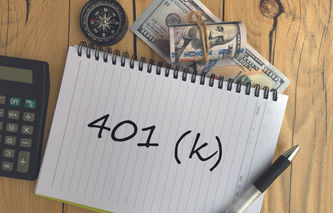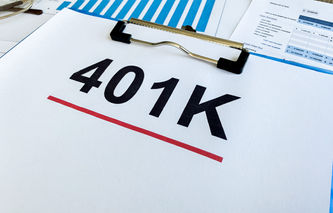Undoubtedly, the market slide that began in December 2007 unveiled some series flaws in the way America saves for retirement. Millions of Americans watched their precious 401(k) retirement savings vanish, as did their hope for an early retirement.
In this article, we're going to talk about some of the serious problems participants in 401(k) plans face during economic downturns. We'll also talk about why this problem is a grim one for Americans as well as their companies. Finally, we'll explain some of the strategies that plan participants can adopt to deal with this dilemma.
401(k) Retirement Plans
Undoubtedly, the 401(k) plan is one of the most innovative arrangements ever conceived of to help Americans achieve a financially secure retirement. These plans allow participants to save for retirement by depositing money into an investment account. Within certain limits, the funds are deposited on a pre-tax basis, and the money is allowed to grow on a tax-deferred basis until withdrawn.
Even more enticing is the fact many companies encourage employees to participate in their company's 401(k) plan by matching contributions. In fact, four years after the introduction of these plans, the U.S. Department of Labor reported there were over 17,000 companies offering 401(k) programs, and over 17.5 million participants. By 2002, there were an estimated 423,000 plans in place, 43 million participants, and total assets estimated to be close to $2 trillion according to information published by the Employee Benefits Research Institute.
Plan Flaws
The success of the 401(k) plan in the late 1990s, as well as pressure to increase corporate earnings, resulted in the decline of traditional pension plans. According to information published by the Pension Benefit Guaranty Corporation, the number of pension plan participants stood at 16.2 million in 2005. That's a decrease of 27% since the 1988 high of 22.2 million participants.
One possible explanation for the decline in the number of pension plans offered by companies could be the replacement of traditional pensions with defined contribution plans such as the 401(k). On the one hand, this can be a tempting offer to the next generation of employees in America, since today's plans allow them to have better control over their retirement destiny. On the other hand, these employees now have their entire retirement nest egg at risk. Employees with a large number of years until retirement will frequently assume more risk in their 401(k) portfolio. This combination, along with a declining stock market, brought a lot of attention to the flaw in thinking that employees could successfully act as their own pension fund managers.
One measure of this problem is seen in the decline of mutual fund values. In the fourth quarter of 2008 alone, mutual funds lost nearly $600 billion in value. Major stock market indexes such as the S&P 500 also experienced significant setbacks that year, falling nearly 40%.
Following these broad market declines, the flaws in the 401(k) pension system were exposed to participants as well as government regulators. Even more alarming was the reaction many investors had to the market decline in 2008: selling stocks in a depressed market. By doing so, these investors locked-in losses that have cut deep into their retirement savings fund.
Protecting Investments
Thankfully, there are strategies that 401(k) participants can adopt to fight back against these problems. Keep in mind that even the highest-performing investment portfolio manager experiences setbacks from time to time. When trying to manage the downside of a portfolio skid, there are two important objectives:
Minimize the potential for a decline
Minimize the time for the portfolio to recover
The two best approaches to combat these problems include:
Educating oneself on investing techniques
Diversifying the investment portfolio
Managing a 401(k) Plan
Taking on the responsibility of managing the retirement funds in a 401(k) portfolio is not a trivial matter. If all goes well, this money will be in excess of one million dollars before reaching retirement age. That's a lot of money to manage, and a 40% loss in funds could mean the difference between a comfortable retirement, and taking on a second career later in life.
The best investor is an educated investor. Individuals working hard to earn their money need to work equally hard to protect their investments. Companies often offer personal finance workshops to help educate their employees. Investing is not an intuitive process, so it's important to understand the fundamentals of stocks and bonds, including how to choose excellent stocks.
It's vital to understand how to diversify a portfolio, so any decline will be minimized and short-lived. It's equally important for individuals to understand their risk profile, which is a measure of tolerance for portfolio losses. Avoid placing too many funds in one stock; this means keeping less than 10 to 20% of the fund's balance in a single company, mutual fund, or industry.
Finally, it's critical to remain calm when a portfolio experiences a loss. A sound financial plan, and a diversified investment portfolio, will keep an investor on solid ground, even when times are difficult. It's also possible to survive a recession since they typically last a relatively short timeframe; especially if there are ten years or more before the money in the retirement fund is needed.



